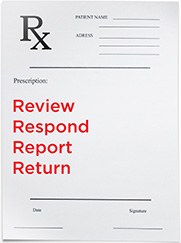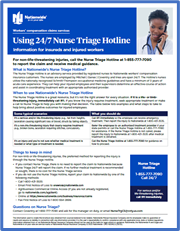4-Step Rx to Control Your Experience Mod

In the world of workers’ compensation insurance, your company’s experience mod is a measure of how well your business controls the frequency and severity of work-related injuries relative to similar businesses. It impacts the premium you pay your workers’ compensation coverage, and in some industries, it can impact the opportunities your business may have to bid jobs or secure contracts
The basic formula used for most states in determining the experience mod (also known as EMR, Experience Rating, Experience Factor, or just Mod) is Actual Losses divided by Expected Losses. Other variables factor into the equation, but that simplified version is the core of the formula. If you have more losses than expected for your class of business, your mod will be greater than 1 (known as a debit mod). If your losses are less than expected, your mod will be below 1 (known as a credit mod). The key is understanding what parts of the equation you can control, and how you can best do that. Follow these four steps for the greatest impact.
Review payroll and class codes
The Expected Losses calculation is determined by the rating bureau used by your state. It is based on the payroll for each worker category at your business (known as class codes). Correctly classifying employees is important for this part of the process, since having workers in the incorrect class code can result in lower expected losses, making it easier to exceed this value. Work with your agent or Nationwide’s premium audit team to ensure correct classifications.

Respond to all injuries
Responding to all injuries reinforces to the employee that they will be cared for and helps to control costs. For life or limb-type injuries, you would call 911 for emergency care. However, for injuries where the level of care is uncertain, taking a “wait and see” approach can be a costly mistake. Nationwide offers a 24/7 Nurse Triage service that can immediately assess the injury and provide information on the next care steps. This provides comfort and assurance to the injured employee, and the injuries handled through Nurse Triage often resolve with self-care (i.e., no cost) or with much less anxiety and cost than a trip to the emergency room. The Nurse Triage service will also report the claim to Nationwide for you.
Some states allow employers to actively select medical providers for treating injuries. Using this option can improve outcomes and save costs. It allows for developing relationships with providers, so they better understand your operation and job demands, and it helps ensure the providers are familiar with the Workers’ Compensation system. Nationwide offers resources to help you understand your state’s rules and to designate medical providers. Our Nurse Triage service will also coordinate care with preferred providers where allowed.
Report all claims
Prompt reporting of all worker accidents – within 24 to 48 hours -- improves the ability to control Actual Losses. If employees are slow to report work-related injuries, this can be a red flag of trust or fear issues that can impact the cost of claims. If you delay reporting, it can impact timely medical care, support from claims services, development of corrective measures, and meeting compliance requirements. Delays in reporting may allow complications to develop in treatment, recovery, or claims management - all adding to the overall cost. Nationwide offers online, phone, fax, and email methods to support prompt reporting.
Return employees to work
In cases where the injury requires work restrictions; it is important to have a program in place that can accommodate these limitations, which allows the employee to return to work when medically appropriate. Getting employees back into a work routine is valuable for their recovery and reinforces their importance in the workplace. In some states, returning employees to work can keep a claim in a “medical only” status and substantially reduce the portion of the claim that goes into the Actual Loss part of the equation. In states where this is not offered, return to work still improves recovery and controls costs. Studies of thousands of workers compensation claims show that the longer an employee remains off work due to an injury, the less likely they are to ever come back to work.1 Nationwide offers a suite of resources to help you develop a successful return to work program.
Effectively putting the above measures in place to keep your experience mod in check is important from a business standpoint. Beyond the insurance cost savings or the job opportunities that may be tied to it, following this Rx also builds a culture of caring, leadership and safety commitment that promotes employee loyalty, trust and engagement. These benefits multiply the mod cost savings through reduced turnover and improved operations. For further assistance in how to control your mod and reduce the impact of accidents, contact Nationwide Loss Control Services at lcs@nationwide.com or 1-866-808-2101.
